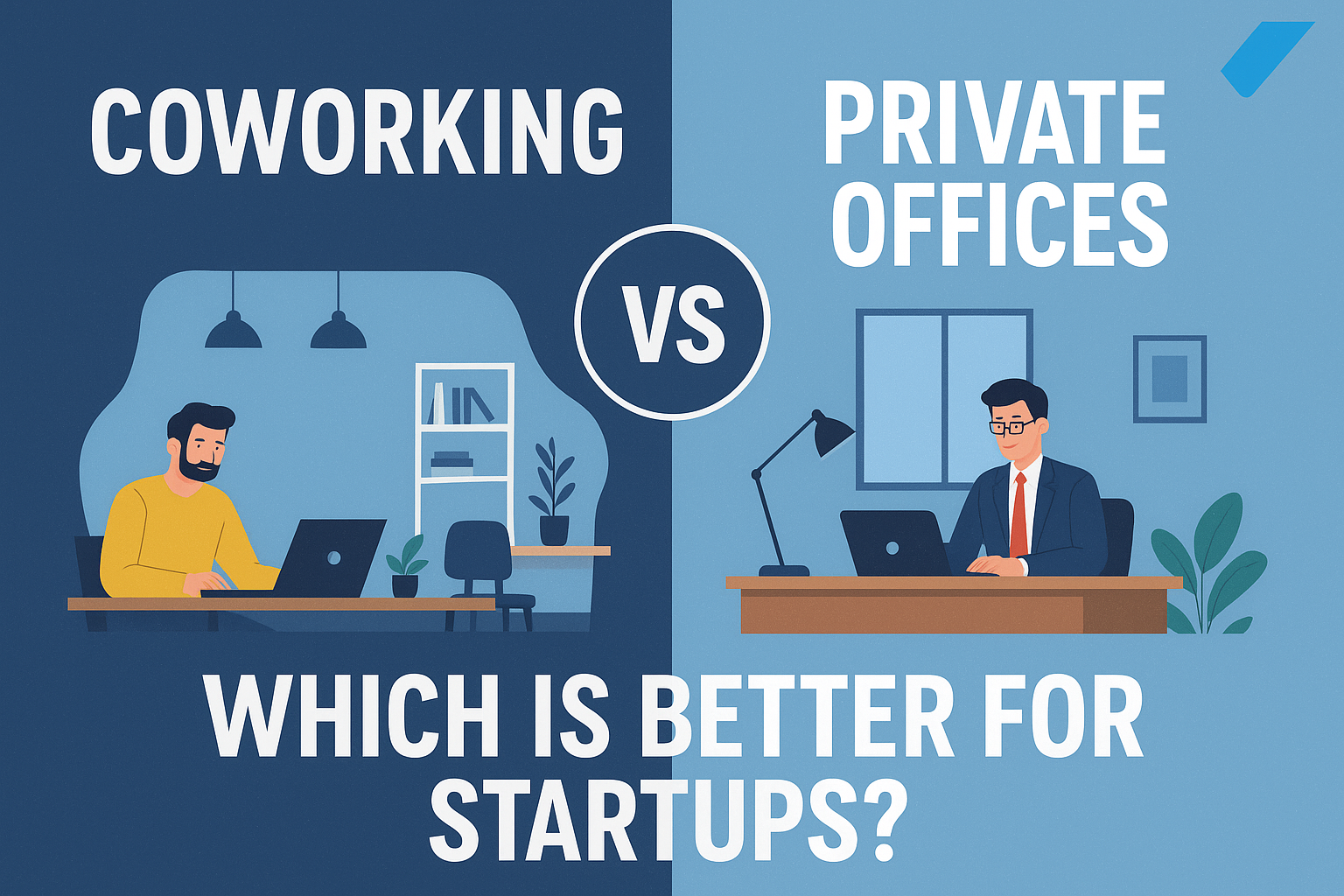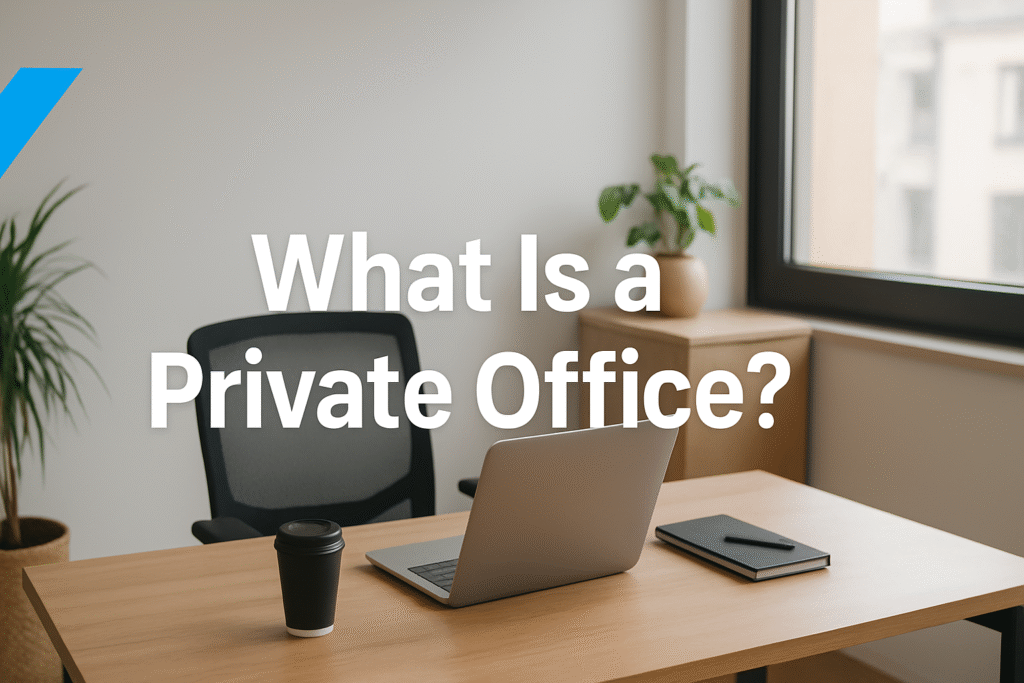
Choosing the right office setup is one of the most critical decisions for startups. Entrepreneurs often find themselves at a crossroads between coworking spaces and private offices. Both options have unique benefits, but the right choice depends on budget, scalability, team size, and long-term vision. In Dubai and other global hubs, this decision can shape not just cost structures but also brand perception and talent attraction. Understanding the nuances of both office models helps startups make smarter, future-proof choices.
- Coworking offers flexibility and networking opportunities.
- Private offices provide privacy, security, and stronger brand identity.
- The right choice balances budget, culture, and growth goals.
What Is a Coworking Space?
Coworking spaces are shared office environments designed for freelancers, startups, and small businesses. These spaces provide modern amenities, flexible rental agreements, and a community-driven ecosystem. Startups benefit from plug-and-play workstations, access to networking events, and opportunities for collaboration. In fast-paced business hubs like Dubai, coworking spaces are becoming a preferred option for entrepreneurs who want agility without long-term commitments.
- Flexible contracts and scalable options.
- Shared facilities: meeting rooms, lounges, high-speed internet.
- Collaborative environment fosters partnerships and idea sharing.
What Is a Private Office?

Private offices are traditional workspaces where companies lease or own dedicated space exclusively for their team. Startups that choose private offices often do so to maintain control, confidentiality, and consistent branding. This setup allows for complete personalization of work culture and space, offering stability for companies with long-term growth plans. In Dubai, many startups eventually transition from coworking spaces to private offices as they scale.
- Full control over layout and branding.
- Dedicated space for your team
- Enhanced privacy and confidentiality.
- Long-term stability and professional image.
Cost of Coworking vs Private Offices in Dubai
One of the most significant factors in choosing between coworking and private offices is cost. Startups need to carefully analyze upfront expenses, recurring costs, and hidden fees. Coworking typically comes with an all-inclusive package covering utilities, internet, and amenities, while private offices often involve long-term leases and operational expenses. Understanding the cost breakdown helps startups align office decisions with their financial strategies.
- Coworking Costs: Monthly memberships, pay-per-desk flexibility.
- Private Office Costs: Rent, utilities, fit-out, maintenance.
- Key Consideration: Short-term affordability vs long-term investment.
| Office Type | Monthly Cost (AED) | Commitment | Best For |
| Coworking Space | 800 – 2,500/desk | Monthly | Startups, freelancers |
| Private Office | 3,000 – 10,000+ | Yearly | Established startups, growing teams |
Flexibility & Scalability for Startups
Scalability is crucial for startups that anticipate rapid growth. Coworking spaces offer unmatched flexibility, allowing businesses to expand or downsize without hassle. Private offices, while less flexible, provide stability for startups with established teams. The ability to scale without incurring heavy penalties makes coworking attractive, but startups aiming for sustained brand identity may prioritize private offices.
- Coworking allows easy team size adjustments.
- Private offices require lease negotiations and space planning.
- Scalability often depends on startup growth trajectory.
Networking & Collaboration Opportunities
One of the strongest advantages of coworking is the built-in networking ecosystem. Startups gain access to like-minded entrepreneurs, potential partners, and even investors through coworking events and informal interactions. Private offices, on the other hand, limit exposure to external opportunities but provide more focused environments. For startups that rely heavily on partnerships, coworking can be a growth accelerator.
- Coworking fosters collaboration and knowledge exchange.
- Networking events boost visibility among industry peers.
- Private offices encourage focus but limit outside exposure.
Privacy & Confidentiality Concerns
Startups dealing with sensitive data or intellectual property often prioritize privacy. Private offices offer secure, exclusive environments, while coworking spaces may pose risks due to shared facilities. For industries like healthcare, fintech, and legal services, confidentiality can be a deciding factor in choosing private offices.
- Private offices ensure data security and confidentiality.
- Coworking may lead to distractions or data vulnerability.
- Sensitive industries benefit from dedicated office spaces.
Branding & Professional Identity
First impressions matter, especially for startups pitching to investors or clients. Private offices often signal stability and professionalism, while coworking conveys agility and modernity. Depending on the target audience, startups may choose office setups that align with their brand values. In Dubai, image-conscious clients often respond better to private offices for high-value deals.
- Private offices enhance trust and brand credibility.
- Coworking appeals to creative and tech-savvy industries.
- Office choice influences client perception and investor confidence.
Productivity & Work Environment

Work environment has a direct impact on productivity. Coworking spaces provide vibrant, collaborative settings that may inspire creativity but also cause distractions. Private offices, in contrast, allow startups to create customized environments tailored to team needs. The balance between creativity and focus determines the best option.
- Coworking energizes with dynamic atmospheres.
- Private offices minimize noise and interruptions.
- Customization supports company-specific workflows.
Legal and Licensing Requirements
Many free zones in Dubai require a physical office for company registration. Coworking spaces sometimes include business licenses in their packages, while private offices align better with long-term licensing needs. Coworking offers short-term contracts, allowing businesses to exit or scale easily. Private offices typically involve multi-year leases with penalties for early termination. Startups must weigh flexibility against stability when choosing the right office model.
- Coworking = flexible contracts, minimal risk.
- Private offices = long-term commitment, less adaptability.
- Lease decisions should align with growth forecasts.
Tech Infrastructure & Amenities
In today’s digital economy, robust infrastructure is essential. Coworking spaces often provide high-speed internet, conference rooms, and IT support as part of the package. Private offices, however, require companies to set up and manage their own infrastructure. Startups must decide whether convenience or control is more valuable.
- Coworking = plug-and-play amenities.
- Private offices = tailored infrastructure but higher setup costs.
- Technology reliability can influence client satisfaction.
Industry Suitability: Which Works Better?
Not all industries thrive equally in coworking or private offices. Creative and tech startups benefit from collaborative coworking cultures, while legal, financial, and healthcare firms prioritize privacy and compliance. Understanding industry-specific needs ensures startups select workspaces that align with operational demands.
- Coworking suits startups in media, tech, design.
- Private offices better serve legal, healthcare, consulting.
- Industry compliance may dictate office requirements.
Case Studies: Startup Success in Coworking & Private Offices
Real-world examples highlight how different startups succeed in diverse environments. Many tech startups in Dubai leveraged coworking to connect with investors and talent, while others in finance scaled faster by establishing credibility with private offices. These case studies illustrate that success is less about office type and more about alignment with goals.
- Tech startups thrive in coworking’s collaborative culture.
- Finance and consulting firms benefit from private offices.
- Hybrid models are emerging as popular alternatives.
You also want to read: Top Business Centers for New Companies in Dubai 2025
Hybrid Office Models: Best of Both Worlds
Hybrid models combine coworking flexibility with private office control. Startups rent coworking memberships for networking while maintaining small private spaces for confidential work. This balance allows startups to enjoy community benefits without compromising privacy. In Dubai, hybrid setups are gaining traction among scaling startups.
- Mix of coworking collaboration and private office privacy.
- Suitable for startups in transition or scaling.
- Cost-effective solution balancing flexibility and stability.
Local Perspective: Dubai’s Startup Ecosystem
Dubai has positioned itself as a global startup hub, with coworking spaces and business centers flourishing across the city. For entrepreneurs entering the Dubai market, coworking offers a cost-efficient entry point, while private offices provide credibility for dealing with corporate clients. Government initiatives and free zones further shape startup office choices.
- Coworking spaces dominate Dubai Marina, Downtown, and Business Bay.
- Private offices attract established startups in DIFC and JLT.
- Dubai Free Zones offer tailored solutions for new businesses.
Making the Right Choice for Your Startup
The decision between coworking and private offices isn’t one-size-fits-all. Startups must consider cost, scalability, brand image, and industry needs. Coworking is ideal for agile, networking-driven businesses, while private offices suit startups seeking stability and confidentiality. In Dubai’s dynamic ecosystem, hybrid models are also worth exploring. Ultimately, the best choice aligns with long-term vision and growth strategies.
- Assess financial health and scalability goals.
- Align office choice with brand positioning.
- Explore hybrid solutions for balanced growth.
Also Read: Virtual Office vs Coworking Space
FAQs
What is the best office solution for startups in Dubai?
The best office solution depends on your startup’s stage, team size, and growth goals. Coworking spaces in Dubai are ideal for early-stage startups looking for affordability, networking, and flexibility, while private offices are better suited for scaling startups that require privacy, branding, and a professional corporate setup.
How much does coworking cost in Dubai?
On average, coworking in Dubai costs between AED 800 – AED 1,500 per month for a flexible desk and AED 1,500 – AED 3,500 per month for a dedicated desk, depending on the location and amenities. Premium business hubs such as Downtown Dubai and DIFC are on the higher end.
What is the price of a private office in Dubai?
Private office rentals in Dubai typically range between AED 3,000 – AED 10,000 per month, depending on the size, location, and facilities. Exclusive business districts like DIFC, Business Bay, and Sheikh Zayed Road tend to be more expensive compared to suburban areas.
Is coworking good for productivity?
Yes, coworking enhances productivity by fostering collaboration, creativity, and networking opportunities. However, some professionals may prefer the quiet workspace and dedicated focus of a private office, making the choice dependent on work style and business needs.
Can I switch from coworking to a private office later?
Absolutely. Many Dubai business centers, including Workstation Business Center, offer scalable solutions that allow startups to begin with coworking and smoothly transition to private offices as they grow, avoiding the hassle of relocation.
Which areas in Dubai have the best coworking spaces?
Popular districts include Business Bay, Downtown Dubai, DIFC, Dubai Media City, and JLT. These locations offer strategic connectivity, prestigious addresses, and access to Dubai’s thriving startup ecosystem.
Are coworking spaces suitable for hybrid work?
Yes. The rise of hybrid coworking Dubai models allows startups to combine remote and in-person work seamlessly, offering shared spaces for collaboration and private zones for focused work.
Do private offices improve branding for startups?
Yes, having a private office in Dubai enhances your startup’s credibility by offering a professional setup, custom branding options, and client-ready meeting rooms, which are critical when pitching to investors or meeting high-profile clients.
What are the future workspace trends in Dubai?
The future of work in Dubai is leaning towards flexible workspaces, hybrid models, and smart office solutions. Startups are increasingly choosing scalable setups that allow seamless transitions between coworking and private offices.
